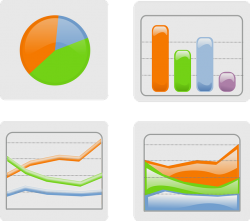Developing a human resource mission statement sample from scratch? It could be a great opportunity to flex your strategic HR muscles.
Earlier this week I talked about understanding the business as a part of the strategic HR planning process. Then I ran into something else that made me think of another area where we can align our HR practices with those of the business.
 One of my friends is going through school to get his MBA right now, and he using upstartHR as his “model” to develop. That basically means that we’ll have to do forecasting, develop a business plan, etc. as part of that. I thought it would be a fun exercise to get some outside insight into the business, but even the most basic piece (a mission statement) challenged me to step back and look at things from the 30,000 foot view.
One of my friends is going through school to get his MBA right now, and he using upstartHR as his “model” to develop. That basically means that we’ll have to do forecasting, develop a business plan, etc. as part of that. I thought it would be a fun exercise to get some outside insight into the business, but even the most basic piece (a mission statement) challenged me to step back and look at things from the 30,000 foot view.
That’s a good thing, by the way.
My human resource mission statement sample
So we walked through the process of developing a mission statement, and here’s what I boiled the entire purpose of upstartHR down to:
Provide human resource products and services that improve the human resources field, one professional at a time.
I don’t know about you, but that feels pretty powerful to me! It inspires me to think about the higher calling I have beyond just “write another blog post for Friday.” Each of you really matter to me, and I think of the interactions in person and via email that I have with you all every time I sit down to write.
So that’s my little piece of the world, but what about you in your role as an HR professional?
Now, let’s jump back into the business and look at how to develop a human resource mission statement sample from an existing organization-wide mission.
Creating your own human resource mission statement
Here’s a snippet from the textbook on what a mission statement is for:
Your mission statement is meant to be a simple, internal message for you and your employees: What is the core value and purpose of the company? What is the vision, which will guide company decisions, now and in the future? Think of it as the rally cry for you and your employees; this is the reason why you do what you do, every day. All other goals should support this mission.
Makes sense, right? Now, let’s update that to reflect the process of human resource mission statement sample development:
Your HR mission statement is meant to be a simple, internal message for you, your leaders, and your employees: What is the core value and purpose of the HR function in this company? What is the vision, which will guide talent management decisions, now and in the future? Think of it as the rally cry for you and your HR staff; this is the reason why you do what you do, every day. All other goals should support this mission.
If we have to break it down into bullets, here’s what I have:
- Simple
- Depict core purpose of HR
- Rallying cry
Don’t make it complex and confusing. If you can’t share it with your employees without a two page explanation, it’s not worth developing in the first place.
Show/share the core purpose of the HR function within your specific organization. Don’t make people wonder what you do everyday–it should be pretty darn obvious.
Finally (the fun one!) it should be a rallying cry. You should be able to use your human resource mission statement sample to lift your spirits when the going gets tough. It needs to be inspirational if at all possible.
Based on my company’s core values and culture, my view of HR is this:
Deliver HR support that enables our staff to meet customer needs on time, every time.
Short and sweet, but it covers about everything I run into in the course of a week. It includes our #1 core value (on time, every time). It focuses on our staff, not my own preferences. And it doesn’t stick to any specific area of HR, it includes recruiting the right people, locking in great benefits for our team, communicating changes to ensure operations are not interrupted, etc.
All that said, does anyone have a human resource mission statement sample to share? I’d love to see some examples.Â
 Sometimes you have to stop and wonder where common sense has gone. Companies are expecting more from their HR team than ever before, but according to data gathered by XpertHR, companies are increasing the number of employees relative to the number of HR professionals.
Sometimes you have to stop and wonder where common sense has gone. Companies are expecting more from their HR team than ever before, but according to data gathered by XpertHR, companies are increasing the number of employees relative to the number of HR professionals. One of my friends is going through school to get his MBA right now, and he using upstartHR as his “model” to develop. That basically means that we’ll have to do forecasting, develop a business plan, etc. as part of that. I thought it would be a fun exercise to get some outside insight into the business, but even the most basic piece (a mission statement) challenged me to step back and look at things from the 30,000 foot view.
One of my friends is going through school to get his MBA right now, and he using upstartHR as his “model” to develop. That basically means that we’ll have to do forecasting, develop a business plan, etc. as part of that. I thought it would be a fun exercise to get some outside insight into the business, but even the most basic piece (a mission statement) challenged me to step back and look at things from the 30,000 foot view. Viola! The HR strategic planning process in a nutshell.
Viola! The HR strategic planning process in a nutshell.